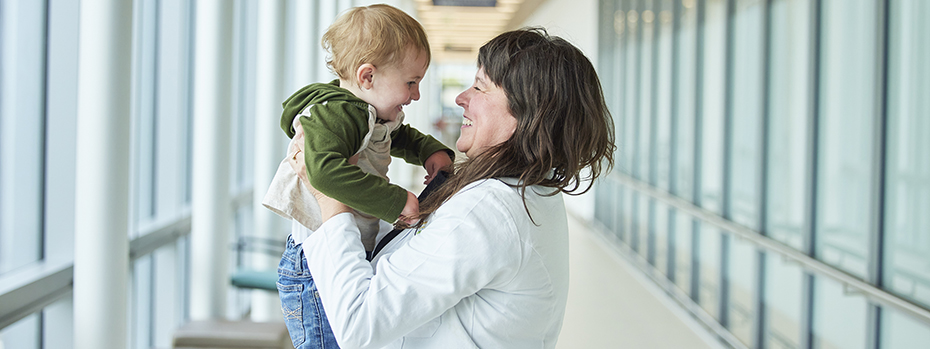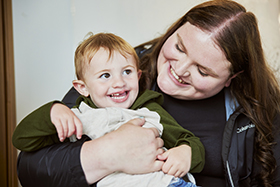Cleft Lip and Cleft Palate Diagnosis and Treatment

Cleft lip and cleft palate are common conditions that can be repaired. Our expert team at OHSU Doernbecher Children’s Hospital treats more children with cleft lip or cleft palate than any other hospital in Oregon. We provide the full range of care for your child’s speech, hearing, appearance and well-being from shortly after birth to early adulthood.
Care for your child’s cleft depends on the type of cleft and when it is diagnosed. We will guide your family carefully through what may be years of treatment for your child. Your child’s care team will stay with your child and family the whole time.
We offer:
- Nasoalveolar molding (NAM), a treatment before cleft lip or palate surgery that helps improve results
- The latest surgical techniques in cleft care
- Orthodontists with cleft lip and cleft palate experience
- Support for your child’s speech and hearing
- Mental health and well-being services
- Access to our jaw surgery team
Diagnosis for cleft lip and cleft palate
Cleft lip: You are likely to learn that your baby has a cleft lip before birth. A cleft lip can be seen on a 3D prenatal ultrasound.
If your child is diagnosed with a cleft lip before birth, you will meet with a pediatric nurse practitioner who can:
- Explain treatment options, which may include surgery
- Connect you with a care coordinator
- Offer counseling and screening for genetic disorders
- Connect you to Doernbecher’s Fetal Care Program to prepare for your child’s birth at OHSU or elsewhere
- Provide resources to help you care for your newborn
Cleft palate: You’re unlikely to learn that your baby has a cleft palate before birth, because ultrasounds can’t show the inside of your baby’s mouth. Your child’s palate will be checked after birth.
Treatments for cleft lip and cleft palate
Your child may have up to 20 appointments in their first year. After this, your child will typically have appointments every six months or once a year.
Birth to 2 months
You will meet your child’s care team and discuss treatment. Your child may have feeding therapy.
You may use lip taping or NAM to prepare your child for cleft lip surgery.
- Lip taping: This treatment helps brings your child’s lips, gums and mouth muscles closer together. Your child wears medical tape as long as possible each day.
- NAM: This treatment can improve the shape of the lip and nose. Your child wears an appliance like a dental retainer until cleft lip surgery. Your child will need to visit the clinic weekly or every other week to have the appliance adjusted.
3 to 5 months
Cleft lip surgery usually happens at this age. Your child’s surgeon will rebuild affected parts of your child’s nose, mouth and face.
The surgery takes several hours. Most patients go home the same day.
12 months
Cleft palate surgery usually happens at this age. The cleft surgeon will close the cleft in the roof of the mouth and rebuild the palate. An ear, nose and throat surgeon may place ear tubes to reduce the risk of ear fluid building up.
The surgery takes several hours. Most patients go home the next day.
1 to 5 years
Your child will have speech and hearing therapy as needed.
Up to 30% of children with cleft palates develop velopharyngeal dysfunction. It happens when the soft palate does not separate the nose from the mouth enough during speaking or eating. This lets air escape through the nose and makes speech difficult. For children with this condition, we may recommend a speech appliance or surgery.
About 20% of children may need palatal lengthening surgery at age 4 or 5. This treatment extends the palate to keep food, drink and air out of the nose. It may improve speech.
Your care team will help you find a dentist in your community who can provide follow-up care for cleft lip and cleft palate.
7 to 14 years
Children may start orthodontic care to straighten their teeth and improve how their jaws work. Some children may have an alveolar bone graft between ages 8 and 10 to repair a cleft in the gum.
Early teens
Children who had a cleft lip may have surgery when their face is fully developed to reduce scarring and improve appearance.
Mid- to late teens
Older teens may have nose and jaw surgery after they’re done growing to improve function or appearance.
Specialists
Our team will create a custom plan for your child that may include experts in:
- Audiology (hearing care)
- Cardiology (heart care)
- Craniofacial surgery
- Dentistry
- Feeding and swallowing
- Genetics
- Neurosurgery
- Nutrition
- Occupational therapy
- Ophthalmology (eye care)
- Oral surgery
- Orthodontics
- Otolaryngology (ear, nose and throat)
- Pediatric plastic and reconstructive surgery
- Physical therapy
- Psychology
- Speech-language pathology
Support services for cleft lip and cleft palate
Mental and social services: Our craniofacial team includes specialists who work with children and families to address issues like teasing or bullying.
Housing and transportation: If your family needs to stay overnight, you may be able to stay at OHSU's Rood Family Pavilion. We have vouchers for discounts at nearby hotels. Our team can help you arrange transportation to OHSU, including help with medical travel for Medicaid patients who live more than 50 miles away.
Language help: We have qualified interpreters to help families whose primary language is not English.
Learn more
- ACPA Family Services: Resources for Your Cleft Journey, American Cleft Palate-Craniofacial Association
- Medical Cleft Resource Library, SmileTrain
- Cleft Lip and Cleft Palate, American Speech-Language-Hearing Association
Location
OHSU Doernbecher Children’s Hospital
700 S.W. Campus Drive
Portland, OR 97239
Free parking for patients and visitors
For referring providers
Refer your patient to OHSU Doernbecher.
Call 503-346-0644 to:
- Seek provider-to-provider advice.
- Request education about plagiocephaly or other conditions.
Care from birth to adulthood

August and Grace Poirier share bonds as nephew and aunt and as cleft lip patients at OHSU.